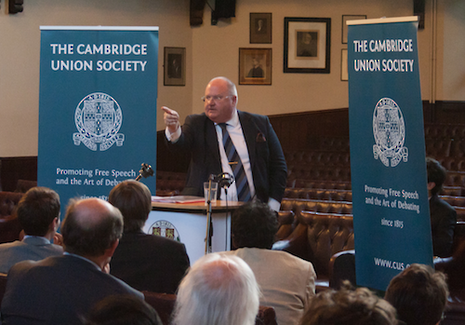Interview: Pickles sours at the Union
Felix Danczak challenges the leading Conservative and reflects on the impact of his speech at the Cambridge Union

In the half-hour before my interviewee arrives, the protesters outside can be heard quite clearly. A loudhailer is playing a merry siren and there is an occasional chant that dies away. One woman has the sign 'put a lid on Pickles' written in fairy-lights. There is a petition stall set up, and the numerous colourful banners make it look like the beginnings of a village fete. Inside, I wait for Eric Pickles with the distinct feeling that he is the special guest – here to pick the raffle tickets, and hand out the prize for best marrow.
Through the back entrance, Pickles arrives late to the party, avuncular and all smiles. Amongst the Cambridge University Conservative Association (CUCA) members here to greet him before his speech, he certainly has many fawning nephews. Somebody has placed a few bottles of port on a table, but he only wants a soft drink – he can see the camera in the room, and presumably knows how that would look.
This momentary snapshot is a good one for explaining his rise to power. His ability to hold the attention of the room, coupled with an instinctive eye for communication and the power of the media, makes Pickles an able politician. He is still all smiles, greeting everyone with a handshake, telling them how good it is to see them. That Pickles' favourite author is PG Wodehouse tells in his humour – quick, dry asides that take a moment to be understood interspersed with easy jokes, often at the expense of himself. Greeting me, I am made to feel welcome.
Mr Pickles is clear about the Government's failings with the Big Society project. “We allowed ourselves to characterise the big society as just volunteering when its clearly something more fundamental than that.” So what is it, the now re-re-re-relaunched initiative? “It’s about a transfer of power to local groups.” He criticises the Thatcher administration to illustrate the point: “We forgot that the public was not just consumers – they are also citizens.” But he is still vague, like many Conservative politicians, about what this means in terms of the Big Society, stating: “A citizen can have a view on something they don't consume. That's what the Big Society is all about.”
Equally, he is direct on the purpose of the Localism bill, and the power being handed to ministers to cut the statutory duties of Councils. “There are two kinds [of statutory duty],” he enumerates. “There are ones which say what is to be imposed (healthcare, allotments) which we're not going to change. However, we might think about removing those that are just strict rules in terms of procedure – we want to stop telling local government how to do it.”
Mr Pickles is convincing on home turf. But when challenged, he is quick to defer blame and paint himself positively. When asked about his cuts to local government, he argues that they are “probably slightly lower than [they] would have been if Labour won the election.” This becomes a recurring theme throughout both the interview and the subsequent speech. By spiriting up the ghost of a maniacal, slashing-and-burning would-be Labour administration, the Conservatives appear quite tame in comparison, creating political cover for their own cuts.
Eric Pickles is far less happy in open debate. He informs us at the end of the speech that ''I've been in politics a long time, so if I don't know the answer [to your question] I'll make something up that sounds complicated.” This raises a laugh. But it turns out to be true. On being persistently questioned on why his cuts hit poorer authorities' budgets harder, he fails to give a satisfactory answer.
The argument is complex, no doubt but rather than engage with it and argue his case – the Cambridge Union audience is not a foolish one – Mr Pickles chooses to bully us with acronyms and figures. “I moved need from 73% to 83%. I think you should also bear in mind that no authority loses more than 8.8% purchasing power, and the average was 4.4%' approved by the LDA.” What does this mean? I ask. “Its the amount of money they are able to purchase,” he says, unhelpfully.
The avuncular uncle reappears for an anecdote as the protesters briefly make audibility an issue. On coming to power, he came to the office finding demonstrators outside. “I just put my cloth cap on and walked through the crowd shouting 'Death to Pickles!'.” Another laugh is raised. But the bully soon returns. He refuses to answer questions on the audit commission because the questioner is mildly factually incorrect. Forced into another corner about cuts, he shouts, “Don't lecture me about poor. Poor is not an abstract concept for me, I know what its like to be poor,” waving his finger accusingly and effectively squeezing out of answering.
But unforgivably, towards the end of the talk, Mr Pickles launched an unprovoked attack on a member of the audience. The question was simple: asking why the Conservatives have trouble with their legacy of being considered 'poor-haters' by a wider public. To which Mr Pickles replied “because rich people like you join the Labour Party,” before refusing to answer the question. The student sought an apology – stating rightly that Mr Pickles knew nothing of his background – but was flatly denied.
After he left, many in the audience, including the president of CUCA, apologised to the student, Charlie Bell, for Mr Pickles' words. There was a general feeling that the speech had been tainted, as a politician, by giving obfuscatory but harmless remarks, had reacted entirely inappropriately to an honest question.
Over most of the two hours I spent talking and listening to him, I had been inclined to give Mr Pickles the benefit of the doubt. Cuts are never going to be popular, and if you want to make them, some people will get hurt. Admitting that in public makes for terrible press: “I feel a front-page coming on,” Mr Pickles had said earlier, half in jest. When his argument had been cogent, he had been convincing. But in bullying members of the audience to get out of answering questions, Mr Pickles lost face and credibility. There is a lesson for politicians of all stripes in that.
Felix Danczak blogs at http://intelligentdebate.wordpress.com/
Read the full story of Pickles protests here
 News / Local business in trademark battle with Uni over use of ‘Cambridge’17 January 2026
News / Local business in trademark battle with Uni over use of ‘Cambridge’17 January 2026 News / Cambridge bus strikes continue into new year16 January 2026
News / Cambridge bus strikes continue into new year16 January 2026 Comment / Fine, you’re more stressed than I am – you win?18 January 2026
Comment / Fine, you’re more stressed than I am – you win?18 January 2026 News / News in Brief: cosmic connections, celebrity chefs, and ice-cold competition18 January 2026
News / News in Brief: cosmic connections, celebrity chefs, and ice-cold competition18 January 2026 Film & TV / Anticipating Christopher Nolan’s The Odyssey17 January 2026
Film & TV / Anticipating Christopher Nolan’s The Odyssey17 January 2026










